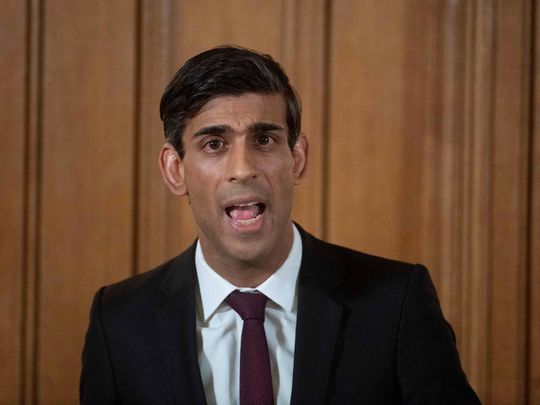
London: Rishi Sunak raised funding for every government department and offered fresh support for working families while pledging to stabilize the UK's pandemic-hit public finances, in a surprisingly expansive budget that channeled the upbeat instincts of his boss, Prime Minister Boris Johnson.
Setting out his plans in Parliament, the Chancellor of the Exchequer unveiled 75 billion pounds ($103 billion) of giveaways and declared that a "new economy" post-Covid would usher in "a new age of optimism."
He began with references to higher employment, better public services and rising wages, before announcing the biggest cut to beer duty in half a century and a one-year tax discount for hospitality firms battered by coronavirus.
Sunak saved his most significant announcement for last: a cut in the so-called taper rate at which the poorest workers lose benefits as their income from work increases - at a cost next year of 2 billion pounds.
The backdrop to his speech is an economy accelerating out of the pandemic but facing challenges including supply disruption, a massive increase in the government debt burden and, perhaps most importantly, rapidly rising inflation and the prospect of higher interest rates. Sunak also warned the country hasn't yet turned the corner on infections, warning of "challenging months ahead."
His response had elements to appeal to the broad range of economic leanings among Conservative MPs - from those demanding help for Britons in a cost of living crisis, to those complaining about the growing demands on the state.
Friedman fan
Despite the giveaways and raising the UK tax burden to the highest level as a percentage of GDP since the early 1950s, Sunak had insisted over the weekend he feels much more affinity with Milton Friedman - the inspiration to many free-market economists - than the acolytes of John Maynard Keynes, who prefer to use government spending to boost growth.
"I don't like it, but I cannot apologize for it as the result of the unprecedented crisis we faced and the extraordinary action we took in response," he said Wednesday of the higher taxes. And with a likely nod to the next general election due in 2024 at the latest but predicted to come sooner, he said that by the end of this Parliament he wants taxes "to be going down, not up."
But he also warned: "We need to strengthen our public finances so that when the next crisis comes, we have the fiscal space to act."
Unveiling new fiscal rules that will guide his approach to rebuilding the economy from its worst recession in a century, Sunak vowed that in "normal times," the government would only borrow to invest and that underlying public sector net debt must be falling as a percentage of output.
Under projections published Wednesday, he'll meet both of those in 2024-25.
Sunak must also navigate accelerating inflation, already well above the Bank of England's 2 per cent target and forecast to rise to at least double that. That's raising the cost of repaying the country's debt, a quarter of which is linked to inflation indexes.
A widely predicted interest-rate hike would add to borrowing costs: For every percentage point that interest rates go up, the Treasury estimates it would cost an extra 23 billion pounds a year.
Still, Sunak's ability to both spend and save was boosted by a significantly improved outlook for the economy from the government's independent fiscal watchdog. It revised upwards its forecast for growth this year to 6.5% from 4 per cent, and downwards its forecast for the long-term economic scarring caused by the pandemic to 2% of output from 3 per cent.
With growth filling the government coffers, the Office for Budget Responsibility's borrowing forecast for the next five years was lowered by 154 billion pounds, while planned debt sales for this fiscal year were cut by a fifth.
The chancellor responded by announcing tens of billions of pounds of investment in infrastructure, education and skills. There was 1.7 billion pounds for local infrastructure, directed at Johnson's signature promise to "level up" opportunities across the country and even out geographical disparities.
Meanwhile the opposition Labour Party's shadow chancellor, Rachel Reeves, accused Sunak of living in a "parallel universe" to struggling families, pointing out that changing the taper on welfare payments won't offset the decision to end an increase of 20 pounds a week introduced during the pandemic.
Yet the immediate priority for Sunak was to satisfy the Tory MPs sitting behind him, and on that he appears to have largely succeeded. Robert Halfon, who has repeatedly called for the cost of living to be reduced, congratulated the chancellor on a "budget for workers."
The influential Conservative chairman of Parliament's Treasury Committee, Mel Stride, said Sunak has "spent quite a lot" of the fiscal headroom provided by a record economic rebound and will be judged on his prudence in the face of higher interest rates making servicing the UK's debt more expensive.
In his speech, Sunak tried to reassure Tories that his instincts - despite his tax and spend agenda - are still grounded in free markets and constraining the role of the state.
The government "should have limits," he said.








